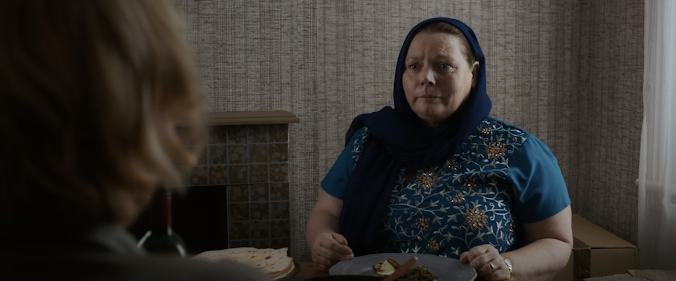Released theatrically in the U.K. in the summer of 2021, After Love, the dramatic feature debut of writer-director Aleem Khan, only started its limited U.S. run last week. This will mark the first stateside release for British distributor Vertigo Releasing, and they must be feeling pretty confident about the word-of-mouth chances of Khan's little movie, given that they've decided to give it the added push outside the usual metropolitan arthouses and straight to select multiplexes. It's an odd gamble to take, given that it's already been a little under three years since After Love did the international festival rounds in 2020, and a little over two years since it swept the British Independent Film Awards for Best Screenplay, Best Actress, Best Supporting Actor, Best Director, and Best British Independent Film. (Its star, Joanna Scanlan, also nabbed a Best Actress at the 75th BAFTA awards.) And while my own tendency is to support almost any independent and foreign film over the meager mainstream offerings (especially in weeks as anemic as the last few), I'm sad to say that After Love hardly makes good on its belated migration to U.S. cinemas, or the certificate of excellence that its hometown consensus implies.
Scanlan stars as Mary Hussein, a childless English woman living in Dover with her Pakistani husband Ahmed (Nasser Memarzia), for whom she converted to Islam and married when she was very young. Following Ahmed's unexpected passing, Mary discovers that he's been carrying on an affair with a French woman named Genevieve (Nathalie Richard), who lives only 20 miles away in the port city of Calais across the English Channel. Mary makes the short journey to Calais in order to confront Genevieve and break the news of Ahmed's death; but Genevieve, seeing Mary in traditional Pakistani clothing, mistakes her for a maid contracted through an agency to help clean up her home in preparation for a move. Too shocked to reveal her true identity, Mary instead finds herself irresistibly drawn into playing the part so that she can surreptitiously find out more about Genevieve and Ahmed's relationship. Shortly, she discovers that Ahmed was not only having an affair, but leading something of a double-life, having sired a now teenage son with Genevieve named Solomon (Talid Ariss).
The big problem with After Love from the very beginning is that the contrivance it takes to inject Mary into Genevieve and Solomon's life is rather unbelievable; or, at least, Mary's motivation to keep up pretenses from the outset instead of crumbling and running away from a shocking situation are not effectively conveyed. Khan displayed promise as a short film director, but even with his 2015 BAFTA-nominated breakthrough Three Brothers, his style of writing and direction was sketchy, displaying a potential for a very emotionally effective combination of impressionism and social realism, but never quite implying much more than it showed. Committed to feature-length, his visual and conceptual strengths are stretched too thin, and the lack of attention to basic dramatic detail in his writing is made all the more apparent. This is a short film premise given to a breathier format that it can't live up to. Shock and grief can only go so far in justifying Mary's very particular drive to investigate her husband's secret life, but the actions required to get the narrative chugging along are peculiar and invasive to a degree that Khan doesn't seem to adequately comprehend, or else he is overly dependent upon his star to fill in the gaps of his own immature characterization. The same goes for Genevieve and Solomon themselves, with the former especially portrayed as rather credulously inviting when contrasted with the awkward rudeness and frequent blank stares that dominate Scanlan's performance. Her assumption that Mary is of a lower class than her because of the cultural significance of her dress is a cheap lacing of social irony that, like the revelation of Solomon's homosexuality, is there to flatter a pretense of thematic texture. But it is otherwise entirely superficial and impertinent to the dramatic thrust of the story, which is ultimately about one of the most mundane and unremarkable things in the world: infidelity. Women who discover that their husbands kept other women or hid secret children may act grief-stricken, or shocked, or angry, but they don't act like this. Obviously, Mary is exceptional and different, but there just isn't anything here to infer why she is exceptional or different.
After Love is simply too obtuse and obvious in its myopic focus on driving the narrative forward, as opposed to meaningfully describing the subjectivity of its characters. Khan or the film's producers could have at least gotten the most out of the potential for an understated atmosphere of isolation by exploiting Mary's inability to speak or understand French, emphasizing her tension, nervousness, and obsession by not revealing too much about what Genevieve and Solomon discuss and fight about. But every mundane scrap of conversation is subtitled here, both preventing us from really experiencing the story from a distinct perspective, and signaling a lack of faith in the spectator to infer from even the most obvious of context clues. There's also, of course, an unintended admission that Khan's writing is too confused, and his direction of the actors too vague, to really convey anything beyond exposition. After Love is all too apparently not a genuine character study. It is all about those things that need to happen, so to speak, because Khan's motivations are towards the escalation of action, the building to key moments of dramatic discourse, dispute, and cliche. The "why" of it all just hangs around unattended, bound up in the purest kind of pretension.

Comments
Post a Comment